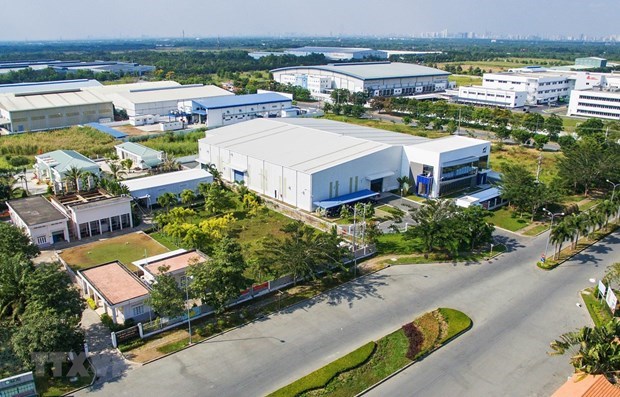 Economy
Economy


|
| Developing the infrastructure system of industrial parks is important to attract quality foreign investment. — Photo tapchitaichinh.vn |
HÀ NỘI — Việt Nam needed to focus on developing the infrastructure system of industrial zones (IZs) to draw clean and quality foreign direct investment (FDI) in the context of the global production shift, heard a conference on Friday in Hà Nội.
Speaking at the second Industrial Real Estate Forum, Trần Thị Hồng Minh, Director of the Central Institute for Economic Management (CIEM), said Việt Nam had significant opportunities to attract quality FDI, given the Government’s success in containing the COVID-19 pandemic and efforts to recover economic growth post-pandemic.
In a more uncertain global economy after the pandemic, foreign investors would be more cautious in selecting destinations for their investments and would wish to diversify investment destinations.
“What’s important now is that Việt Nam must improve the infrastructure system for production and business. Developing the infrastructure of IZs is of special importance,” Minh said. “The golden opportunity is there and it’s time to act.”
Minh said the development of industrial property must contribute to promoting green growth and corporate responsibility, adding that nowhere was more advantageous than IZs to test the circular economy.
Investment in IZs must also take into account labour issues and social security, she said. The efficiency of IZs should not only be evaluated based on the occupancy rate, export scale and contribution to the State budget but also links among them.
According to Trần Quốc Trung, Deputy Director of the Economic Zones Management Department under the Ministry of Planning and Investment, the development of IZs must promote local strengths and regional links.
A system of core IZs must be formed to lead the development of major industries, Trung said.
The focus would also be placed on improving the efficiency of IZs, encouraging modern and environmentally-friendly technologies and diversifying investment co-operation models in developing IZs’ infrastructure system, he said, adding that private investment was encouraged.
It was also important to develop new-generation IZs, such as eco-industrial parks, supporting IZs, sectorial-specialised IZs and industrial and urban and service complexes, he said.
Former Deputy Minister of Natural Resources and Environment Đặng Hùng Võ said eco-industrial parks were now increasingly popular across the world and it’s time for Việt Nam to develop this model.
Director of the Foreign Investment Agency Đỗ Nhất Hoàng said Việt Nam needed to prepare clean land to meet the requirements of foreign investors together with the eco-system for IZs, including houses for workers, culture centres and logistics centres. In addition, developing a skilled labour force would attract investment.
According to Nguyễn Mạnh Hà, Deputy President of the Việt Nam Real Estate Association, it was necessary to raise stronger policies to promote the development of homes for workers at IZs.
Việt Nam has an estimated demand of 8.3 million sq.m of houses for workers but supply now meets only 28 per cent of demand
The Ministry of Planning and Investment’ statistics showed that as of the end of May, there were 561 IZs nationwide with a total area of 201,000 hectares (or 0.6 per cent of the country’s total area). Of them, 374 were operational.
Boost from new trade deals
The European Union – Việt Nam Free Trade Agreement (EVFTA) has been forecast to draw investment into Việt Nam, which would benefit the real estate market, especially the industrial property segment.
According to real estate service firm Savills Việt Nam, a wave of investors would land on Việt Nam in the context of a global production shift, hiking demand for industrial land.
High-end residential and office segments would also benefit, Savills forecast.
Lê Trọng Hiếu from real estate service firm CBRE Việt Nam said the trade deal would contribute to changing Việt Nam’s economic landscape. He predicted the demand for industrial land from European companies would increase soon, which would aid the industrial property segment in the next few years.
Hiếu said IZs which had good connectivity to ports would catch the eyes of investors, such as in Vĩnh Phúc, Hưng Yên, Hải Phòng and Hải Dương in the north and Long An and Vũng Tàu in the south.
However, limited industrial land supply and shortage in the labour force remained problems. — VNS




